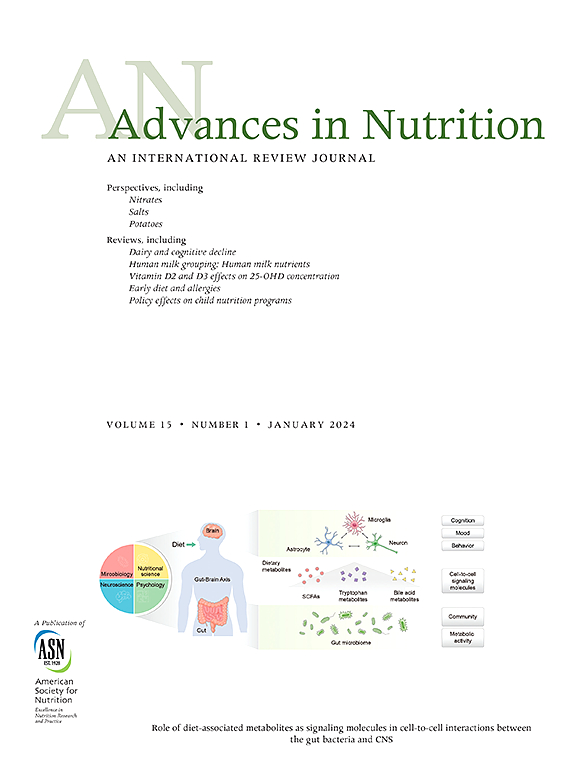非营养型甜味剂对儿童和青少年体重指数的影响:随机对照试验和前瞻性队列研究的系统回顾和元分析》。
IF 9.2
1区 医学
Q1 NUTRITION & DIETETICS
引用次数: 0
摘要
尽管非营养型甜味剂(NNS)的消费量在不断增加,但其对儿童和青少年体重指数[BMI(以 kg/m2 为单位)]的影响仍不明确。有必要进行详细的系统评估。我们旨在根据 NNS 类型、研究设计、持续时间、分析类型、利益冲突 (COI)、地理区域、年龄、性别和基线 BMI,总结有关 NNS 消费量与儿科人群 BMI 性别和年龄特异性绝对变化(kg/m2)的证据。我们检索了针对儿童(2-9 岁)、青少年(10-24 岁)和年轻成人(20-24 岁)的随机对照试验 (RCT) 和前瞻性队列研究。通过随机效应荟萃分析得出了BMI变化的汇总估计值,并对证据质量进行了整体评估和分组评估。从 2789 项研究结果中,我们纳入了 4 项 RCT [n = 1372;平均随访时间 = 42.6 周(标准差 = 18.4);2 项(50%)有 COI],以及 8 项前瞻性队列研究 [n = 35340;中位数随访时间为 2.5 年(四分位间范围 = 1.7-6.3),2 项(25%)有 COI]。与含糖饮料(SSB)相比,随机分配 NNS 饮料(25-2400 毫克/天,来自饮料)显示 BMI 增加较少[平均差异 = -0.114 kg/m2(95% 置信区间 [CI]:-0.207,-0.021);I2 = 87.02%]。分层估计结果表明,青少年、基线肥胖参与者、混合 NNS 消费者、较长试验和无 COI 试验的 BMI 增幅较小。前瞻性队列的汇总估计值显示,NNS 饮料与 BMI 增长之间存在不显著的关联[0.05 kg/m2 (95% CI: -0.03, 0.13);I2 = 75.06%;每日每份 355 mL]。分层估计值保持一致。剔除有 COI 的研究会降低估计值。证据质量为中低水平。总之,将无营养饮料与固态饮料进行比较的 RCT 汇集结果显示,肥胖青少年的 BMI 增长较少。对长期队列研究进行的元分析表明,NNS 饮料与 BMI 变化之间没有显著关联。该试验在 PROSPERO 注册为 CRD42022352284。本文章由计算机程序翻译,如有差异,请以英文原文为准。
Effects of Nonnutritive Sweeteners on the BMI of Children and Adolescents: A Systematic Review and Meta-Analysis of Randomized Controlled Trials and Prospective Cohort Studies
The effect of nonnutritive sweeteners (NNSs) on the body mass index [BMI (in kg/m2)] of children and adolescents remains unclear despite rising consumption. Detailed systematic evaluations are warranted. We aimed to summarize evidence on NNS consumption and BMI sex- and age-specific absolute changes (kg/m2) in pediatric populations, by NNS type, study design, duration, analysis type, conflicts of interest (COI), geographical region, age, sex, and baseline BMI. We searched randomized controlled trials (RCTs) and prospective cohort studies in children (2–9 y), adolescents (10–24 y), and young adults (20–24 y). Pooled estimates derived from random-effects meta-analysis for BMI changes, and the evidence quality was evaluated overall and by subgroup. From 2789 results, we included 4 RCTs [n = 1372; mean follow-up = 42.6 wk (standard deviation = 18.4); 2 (50%) with COI], and 8 prospective cohort studies [n = 35,340; median follow-up 2.5 y (interquartile range = 1.7–6.3), 2 (25%) with COI]. No identified studies evaluated NNS in food, NNS beverages compared with water, or participants aged 20–24 y. Random allocation to NNS beverages (25–2400 mg/d, from beverages) showed less BMI gain [mean difference = −0.114 kg/m2 (95% confidence interval [CI]: −0.207, −0.021); I2 = 87.02%] compared with sugar-sweetened beverages (SSBs). Stratified estimates resulted in less BMI gain in adolescents, participants with baseline obesity, consumers of mixed NNS, longer trials, and trials without COI. Pooled estimates from prospective cohorts showed a nonsignificant association between NNS beverages and BMI gain [0.05 kg/m2 (95% CI: −0.03, 0.13); I2 = 75.06%; per daily 355 mL serving]. Stratified estimates remained consistent. Removing studies with COI attenuated estimates. Evidence had low to moderate quality. In summary, pooled results from RCTs comparing NNS beverages compared with SSBs showed less BMI gain in adolescents with obesity. Meta-analyses of long-term cohort studies did not display a significant association between NNS beverages and BMI changes.
This trial was registered at PROSPERO as CRD42022352284.
求助全文
通过发布文献求助,成功后即可免费获取论文全文。
去求助
来源期刊

Advances in Nutrition
医学-营养学
CiteScore
17.40
自引率
2.20%
发文量
117
审稿时长
56 days
期刊介绍:
Advances in Nutrition (AN/Adv Nutr) publishes focused reviews on pivotal findings and recent research across all domains relevant to nutritional scientists and biomedical researchers. This encompasses nutrition-related research spanning biochemical, molecular, and genetic studies using experimental animal models, domestic animals, and human subjects. The journal also emphasizes clinical nutrition, epidemiology and public health, and nutrition education. Review articles concentrate on recent progress rather than broad historical developments.
In addition to review articles, AN includes Perspectives, Letters to the Editor, and supplements. Supplement proposals require pre-approval by the editor before submission. The journal features reports and position papers from the American Society for Nutrition, summaries of major government and foundation reports, and Nutrient Information briefs providing crucial details about dietary requirements, food sources, deficiencies, and other essential nutrient information. All submissions with scientific content undergo peer review by the Editors or their designees prior to acceptance for publication.
 求助内容:
求助内容: 应助结果提醒方式:
应助结果提醒方式:


